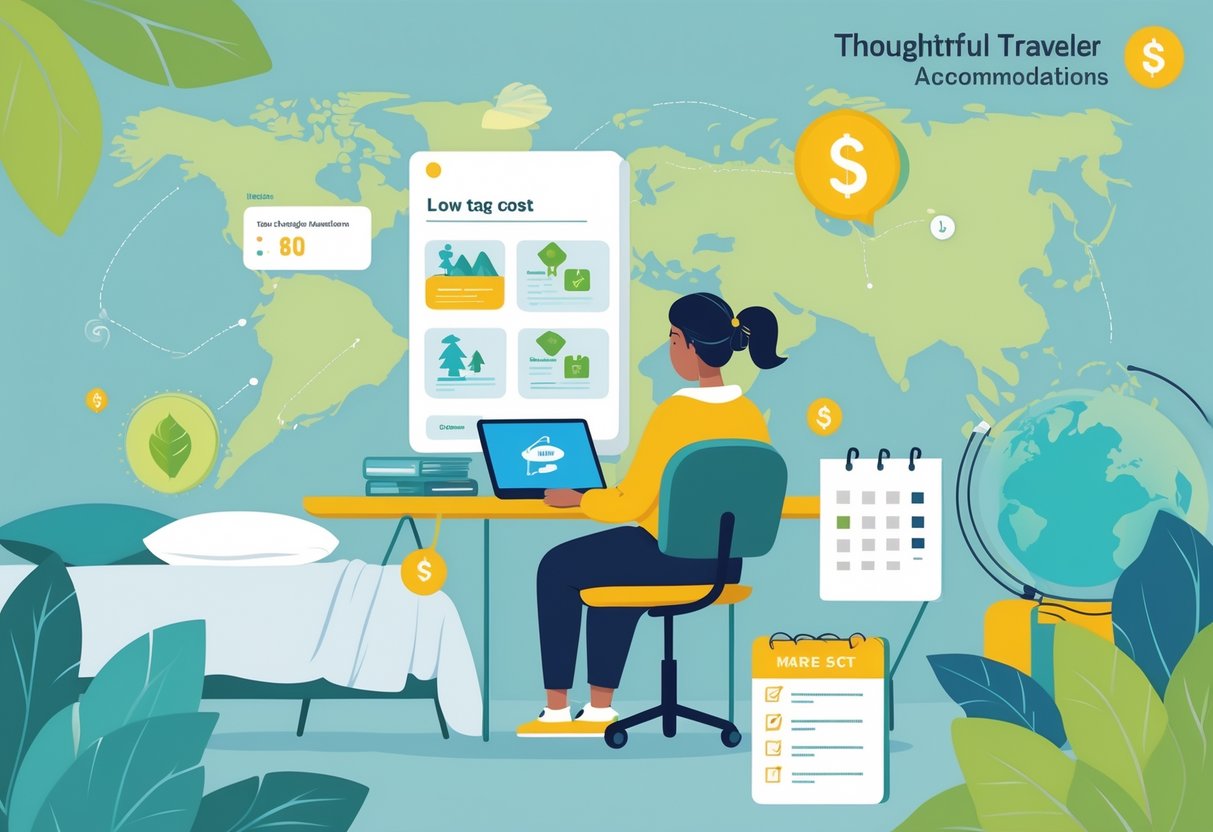Growing fresh herbs, veggies, and flowers in your apartment? Totally doable, even if you're short on space. Starting a mini apartment garden might actually save you some cash on groceries—especially with herbs and salad greens—but your setup costs and plant choices will shape how much you save.
How to Choose a Comfortable, Yet Budget Friendly Accommodation for Your Holiday
Finding that sweet spot between comfort and affordability when
booking holiday accommodation? It takes more than just clicking the
lowest price you see. A lot of people think sticking to a budget
means giving up on comfort, but honestly, that's not always true.
Better planning can save you from a disappointing stay and, frankly, a
lot of regret.

The trick to nabbing comfortable, budget-friendly accommodations? Get clear on your priorities, dig deep with your research, and book at the right time. Sure, nightly rate matters, but smart travelers look at location, must-have amenities, and discounts before making a choice. It's not just about pinching pennies—it's about getting the best bang for your buck.
Understanding Your Priorities for Budget Travel

Picking a budget-friendly place to stay means you've got to know what you actually need for comfort, decide what you can spend, and figure out which amenities really matter to you. Without some ground rules, it's way too easy to spend more than you planned—or end up somewhere you'll dread.
Identifying Comfort Needs and Preferences
Everyone's got their own definition of comfort when they travel. Maybe you can't sleep unless the mattress is just right and the room's quiet. Or maybe you care most about spotless bathrooms and fresh renovations.
Essential comfort factors include:
- Room temperature control
- Bathroom privacy and cleanliness
- Bed quality and linens
- Noise levels
- Safety and security features
It's worth separating the true must-haves from the "nice but not necessary." If you're traveling for work, you might need solid Wi-Fi and a desk. Families, on the other hand, often want extra space or a kitchen.
Location plays a role, too. Some travelers pay more to stay right in the city center, while others are fine with a longer commute if it saves money. Budget travel accommodation strategies are all about knowing your minimum comfort level—otherwise, you risk an unhappy stay.
It really comes down to knowing yourself. If you're picky about beds, focus on reviews that mention sleep quality. Don't get lured by flashy lounges you'll never use.
Determining Your Ideal Budget Range
Set a clear budget for where you'll stay, and you'll avoid blowing your travel fund on a single splurge. Most financial experts suggest putting about 25-30% of your total trip money toward accommodation, but of course, it depends on the destination.
Figure out your nightly limit by dividing your total accommodation budget by the number of nights. For example, if you have $600 for a week, that's about $85 per night—don't forget to count taxes and fees.
Budget calculation factors:
- Trip duration
- Destination cost of living
- Seasonal pricing variations
- Additional fees and taxes
- Currency exchange rates
It's smart to check average accommodation costs for your destination and travel dates. Prices can double during peak season, so timing really matters for your wallet. Smart budget planning means knowing what to expect before you book.
Honestly, it helps to give yourself a 10-15% buffer for surprises or possible upgrades. That way, you're not stuck if something better pops up and you want to spring for it.
Balancing Amenities with Price
Pick amenities that actually matter to you, and you'll get more value for your money. Not everything that sounds nice is worth paying extra for—sometimes, less is more.
High-value amenities typically include:
- Free Wi-Fi
- Complimentary breakfast
- Free parking
- Kitchen facilities
- Laundry access
Things like pools, gyms, or concierge services can drive up the price, but do you really need them? If you're not going to use them, skip 'em and save your cash. Focus on what you'll actually use, not just what looks good on a list.
Amenities can depend on where you're staying. In the city, you probably care more about public transit than parking. At the beach, maybe it's all about walking to the water instead of having a fancy TV.
Comparing accommodation types shows hostels are great for socializing, vacation rentals for kitchens, and budget hotels for the basics. Each works for different needs and budgets.
Honestly, most travelers end up trading luxury extras for a better location or longer trip. After all, the real memories happen outside your room.
Selecting the Right Accommodation Type
Hostels, hotels, guesthouses, vacation rentals—each has its own perks, especially if you're watching your wallet. If you know what matters to you, it's easier to weigh the trade-offs between price, comfort, and convenience.
Comparing Hotels and Hostels
Hotels give you privacy and consistent service, but you usually pay more for that. Budget hotels at least offer private rooms, en-suite bathrooms, and daily housekeeping—sometimes with a 24-hour front desk.
Hotels offer a wide range of options, from budget-friendly to luxury, plus extras like restaurants or gyms. Prices swing a lot depending on location, season, and star rating.
Hostels are the go-to for cheap stays, thanks to shared dorms. They usually have communal kitchens, hangout spaces, and laundry—so you can save on meals and meet other travelers. That's a win-win, right?
Key hostel benefits:
- Dormitory beds starting from $15-30 per night
- Social environment for meeting fellow travelers
- Shared facilities that encourage interaction
- Private rooms available at higher rates
Hostels prioritize safety with secure lockers, 24-hour reception, and surveillance systems. Many offer female-only dorms for extra peace of mind.
Exploring Guesthouses and Vacation Rentals
Guesthouses, usually family-run, hit a nice balance between price and personal touch. You'll often get a private room, sometimes breakfast, and maybe even some insider tips from your host.
These places usually cost a bit more than hostels but less than hotels. The smaller setting can mean more local flavor and a chance to chat with your hosts.
Vacation rentals, like apartments or houses, work great for families or groups. You get kitchen access, more space, and a homey vibe—ideal for longer stays.
Vacation rental advantages:
- Kitchen facilities reduce dining costs
- More space than traditional hotel rooms
- Washer/dryer access for longer stays
- Local neighborhood experiences
Sites like Vrbo list all sorts of rentals, with plenty of guest reviews and photos. Watch out for minimum stays and cleaning fees—they can sneak up on you.
Considering Airbnb and Unique Stays
Airbnb connects you with locals offering rooms, entire homes, or quirky places like treehouses. You'll find everything from budget-friendly options to something totally unique.
Private rooms on Airbnb can be cheaper than hotels, and you might get access to common areas or breakfast. Renting a whole place is perfect for groups who want privacy and a kitchen.
Chatting with hosts lets you ask about amenities, location, or get local tips. Many hosts even have guidebooks with restaurant picks or things to do.
Airbnb booking considerations:
- Service fees added at checkout
- Cancellation policies vary by host
- Guest reviews indicate property accuracy
- Host response time affects communication quality
Alternative lodging options like Airbnb provide unique experiences and cost savings compared to traditional accommodations. Photos and detailed descriptions help you know what you're getting into—at least most of the time.
Evaluating Locations for Maximum Value

Where you stay affects more than just your lodging bill—it can impact your transportation costs and even how much you enjoy your trip. Balancing proximity to attractions, neighborhood safety, and transit access is key if you want to stretch your budget.
Staying Near Popular Tourist Areas
Sure, staying steps from the main sights is super convenient, but you'll pay for it. Hotels right by landmarks often charge 30-50% more than those just a bit farther out.
The trick is to find that sweet spot—close enough to walk, but not so close you're paying a premium. Usually, places 4-6 blocks away offer good savings and you're still within easy reach.
It's worth checking out how to decide where to live based on key factors—it applies to vacation planning, too. Weigh convenience against cost, and don't be afraid to look just outside the main tourist drag.
Distance vs. Cost Analysis:
- 0-2 blocks: Premium pricing, maximum convenience
- 3-5 blocks: Moderate pricing, good walkability
- 6-10 blocks: Budget-friendly, short transit ride needed
Secondary tourist zones can offer better value. Neighborhoods next to popular spots usually have lower prices but are still close to the action.
Use online maps to find accommodations near several attractions. If you can walk to multiple places, you might even save on transit.
Assessing Proximity to Public Transportation
Being near public transit can save you a bundle on daily travel. If you're close to a metro or bus stop, you'll probably skip pricey taxis and rideshares.
It's smart to crunch the numbers. Sometimes, paying $20 more per night for a hotel near transit actually saves you $40 a day on getting around—especially if you're traveling with someone else.
Transit Proximity Checklist:
- Walking distance to nearest station (under 5 minutes ideal)
- Direct routes to major attractions
- Operating hours matching your schedule
- Safety of surrounding area during evening hours
Look into local transit passes—some cities offer unlimited rides for tourists, which makes staying near a station even more valuable. It's worth reading reviews to see if noise from trains or buses is an issue. No one wants a sleepless night just for a slightly cheaper stay.
Choosing Safe and Convenient Neighborhoods
Safety and environment factors shape accommodation value far beyond just sticker price. Well-lit streets, steady foot traffic, and visible security usually point to safer neighborhoods.
Dive into local crime stats and recent visitor reviews before you book. Neighborhoods with busy business districts tend to have better security and more evening dining options.
Safety Assessment Factors:
- Street lighting quality
- Police station proximity
- Local business hours and foot traffic
- Recent crime reports or incidents
Convenience means more than just safety. Staying near grocery stores, pharmacies, and restaurants can cut meal costs and make life easier, especially after a long day.
Residential neighborhoods often feel quieter and cost less than busy commercial areas. These spots usually have local markets and authentic food you just won't find in touristy zones.
Check the walkability score and see what amenities are nearby. Places with high walk scores usually give you better access to daily essentials, and prices can still be competitive.
Securing the Best Deals and Discounts
Smart travelers don't just accept the first price they see—they compare across platforms and time their bookings. If you play your cards right with loyalty programs, early planning, and picking the right platform, you can save anywhere from 20-40% on hotels.
Leveraging Booking Platforms and Review Sites
Different booking sites show different prices for the very same room, thanks to commissions and promo deals. Always compare rates across major sites like Booking.com, Expedia, and Hotels.com before you commit.
Price comparison tools pull rates from dozens of platforms all at once. They save you time and make sure you don't miss the lowest price. Some even offer price-matching if you find a better deal elsewhere.
Review sites like TripAdvisor go way beyond price—they let you see what real guests say about cleanliness, service, and amenities. Sometimes paying a bit extra makes sense if the reviews consistently rave about the experience.
Direct booking benefits can include upgrades, flexible cancellations, and loyalty points. Hotels often match third-party prices and toss in perks you won't get elsewhere.
Finding Special Deals and Loyalty Programs
Hotel loyalty programs really pay off if you travel often. Members usually get 10-15% off, plus perks like free breakfast, Wi-Fi, or room upgrades. Big chains like Marriott, Hilton, and IHG let you join for free and start earning right away.
Secret deal programs like Priceline and Hotwire can save you 30-50% if you're flexible. You won't know your exact hotel until after you book, but the savings can make the mystery worth it.
Subscribe to hotel newsletters for flash sales and member-only promos. Many chains drop their best deals to email subscribers before making them public, so it's worth signing up if you want first dibs on discounts.
Package deals that bundle flights and hotels often come out cheaper than booking separately. Travel sites negotiate rates in bulk and pass the savings to you.
Booking in Advance vs. Last-Minute Offers
Booking ahead usually gets you the best rates for popular spots during busy times. Hotels release rooms 6-12 months out at promo prices to lock in early reservations. As dates fill up, prices go up—especially for business or vacation hotspots.
Last-minute deals work if you're spontaneous and visiting less crowded places, or traveling off-season. Hotels would rather fill empty rooms at a discount than let them sit vacant, so prices drop 24-72 hours before check-in.
Optimal booking windows by destination:
- Beach resorts: 2-3 months ahead
- City hotels: 1-6 weeks ahead
- Business districts: Same week or last-minute
Some mobile apps have exclusive last-minute deals you won't find on desktop. If you're flexible and can book on the go, you might score a great price with just a few taps.
Always check cancellation policies when you book early. Free cancellation lets you rebook if prices drop, so you get the perks of advance planning without losing flexibility.
Making Smart Booking Choices
The way you book—and when—can really change what you pay and how much wiggle room you have. Booking direct often means better rates and service, but always understand the fine print on cancellations.
Booking Directly with Properties
Hotels usually save their best rates and perks for people who book through their own websites. Third-party sites just can't compete with some of these direct-only deals.
Direct booking advantages include:
- Price matching guarantees
- Free Wi-Fi upgrades
- Complimentary breakfast
- Room upgrades when available
- Better customer service access
When you book direct, hotels avoid paying commissions and often pass those savings to you as lower rates or better amenities.
Many hotels offer "best rate guarantees"—they'll match or beat any price you find elsewhere. It's smart to check third-party prices first, then go to the hotel's site to see if you can do better.
If something goes wrong, direct bookings make it easier to sort things out. Hotel staff can tweak your reservation directly, without having to go through a middleman.
Understanding Cancellation and Refund Policies
Cancellation policies can be all over the place. Flexible rates cost more upfront but save you hassle if plans change.
Common policy types:
- Free cancellation: Usually 24-48 hours before arrival
- Non-refundable: Lowest rates with no cancellation option
- Partial refund: 50-75% refund with advance notice
- Prepaid: Full payment required, limited cancellation rights
Always read the cancellation terms before you finish booking. Some places charge a penalty equal to one night, others keep the whole amount.
Travel insurance can bail you out on non-refundable bookings if you have a medical emergency or another covered event. It's worth considering for pricier stays or if your plans are shaky.
Booking platforms and hotels sometimes have different cancellation rules. Direct bookings usually give you more flexibility if something unexpected comes up.
Maximizing Comfort Without Stretching Your Budget
It pays to focus on the amenities that really matter—skip the fancy extras and keep your standards high for cleanliness. The trick is to find places that deliver true value with the essentials, not just shiny add-ons.
Choosing Essential Amenities
Pick amenities that make your stay easier and more comfortable. Air conditioning or heating can make or break your trip, especially if the weather's extreme. Reliable Wi-Fi is a must for most folks, whether you're working or just streaming shows.
Kitchen facilities can save you a surprising amount of money. Even just a fridge and microwave let you store leftovers or whip up a quick meal, which really adds up over longer stays.
Private bathrooms with hot water guarantees are huge for comfort. Shared bathrooms can get crowded and aren't great for privacy, especially during busy times.

Laundry facilities are a lifesaver on longer trips. On-site washers mean you don't have to pay crazy hotel laundry fees or hunt down a laundromat in a new city.
Evaluating Value for Money
Look at the total price, not just the nightly rate. Hidden fees for parking, Wi-Fi, or cleaning can blow your budget if you're not careful. Ask for a full price breakdown before you book.
Location accessibility can make a big difference in daily costs. If you're close to public transit or can walk to attractions, you'll save a lot on transportation.
Watch out for booking platforms that show low base rates but tack on taxes and fees at checkout. The final price is what matters, not the teaser rate.
Seasonal pricing can work in your favor if you're flexible. Booking during shoulder season usually gets you 30-40% off, and weekdays are almost always cheaper than weekends.
Group size affects your price per person. Booking a larger place with multiple beds can cost less per head than separate rooms. Shared spaces help keep costs down while still giving everyone some privacy.
Prioritizing Cleanliness and Safety
Recent guest reviews actually tell you more about cleanliness than those glossy promotional photos ever will. If you're scanning reviews, pay close attention to what people say about bathroom conditions, the state of bed linens, and how well everything's maintained.
If you spot a bunch of complaints about hygiene, that's a red flag for bigger problems. It's usually not just a fluke.
Check safety features the moment you arrive—don't just assume they're fine. Working locks on doors and windows are non-negotiable for peace of mind.
Entrances and hallways that are well-lit make a huge difference, especially if you're coming back late. Nobody wants to fumble around in the dark, right?
When you see broken fixtures, peeling paint, or furniture that's seen better days, it's hard not to wonder if management cares. Neglected upkeep often goes hand in hand with questionable cleanliness and, honestly, possible health risks.
You should always know how to reach someone in case of an emergency. Emergency contact information shouldn't be a scavenger hunt.
If management responds quickly to issues, that's a good sign. Open lines of communication can keep little hassles from turning into total disasters.
It's worth digging into the neighborhood before you book. Even the nicest place loses its appeal if you're in an area with high crime or barely any lighting at night.
Thrift stores give you the chance to score unique stuff without breaking the bank or adding to landfill waste. Still, walking into a second-hand shop for the first time can feel like information overload—aisles packed, shelves overflowing, and you're not sure where to even start.
Home bartending has changed a lot lately. What used to be a casual hobby now brings cocktail culture right into the living room.



